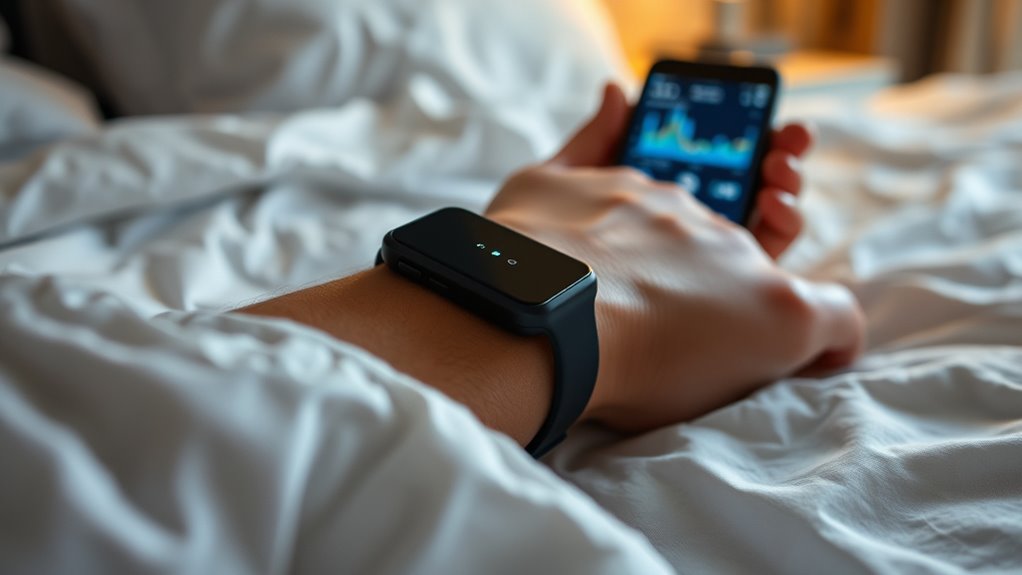Sleep trackers can give you useful trends, but their accuracy varies widely across devices. Some may misreport sleep stages or overlook interruptions, leading to confusion or unnecessary worry. While they’re helpful for spotting patterns over time, they aren’t perfect replacements for clinical assessments. It’s important to view these devices as guides rather than definitive sources. If you want to understand how to interpret your data without causing stress, there’s more to discover.
Key Takeaways
- Sleep trackers vary in accuracy; some devices may misrepresent sleep duration and quality.
- Conflicting data from different wearables can cause user confusion and unnecessary anxiety.
- Wearables provide general insights but lack the precision of clinical sleep studies.
- Using devices as trend monitors and consulting professionals helps mitigate false confidence and stress.
- Understanding device limitations ensures data is used effectively without overestimating its reliability.
Sleep trackers have become popular tools for monitoring your nightly rest, but questions remain about their accuracy and impact on your well-being. You might rely on these devices to gauge your sleep quality and identify patterns, hoping to improve your overall health. However, it’s important to understand that not all wearables provide reliable data. Device reliability varies across brands and models, and this can influence how much you trust the insights they present. If your sleep tracker isn’t precise, you could be misled to think you’re sleeping poorly when, in reality, your sleep quality is good. Conversely, an unreliable device might overlook issues that genuinely need attention, like interruptions or poor sleep stages.
Many users find themselves puzzled by conflicting information from different wearables. One night, your device might report you slept for eight hours, but you wake up feeling exhausted. The next, it might say you only slept six hours, yet you feel refreshed. These discrepancies highlight the limitations of current sleep tracking technology. While some devices use advanced sensors to monitor movement and heart rate, they still can’t perfectly simulate a sleep study conducted in a clinical setting. They can give you a general idea, but they’re not infallible or 100% accurate. This can lead to unnecessary anxiety if you fixate on minor fluctuations, or complacency if you dismiss genuine sleep issues due to overly optimistic readings.
Understanding the limitations of these devices is key to using them effectively. Instead of obsessing over every data point, consider them as helpful guides rather than definitive authorities. Think of your sleep tracker as a tool to spot trends over time rather than a diagnostic device. If you notice persistent inconsistencies or suspect poor sleep quality, it’s best to consult a healthcare professional for a thorough evaluation. Relying solely on a device can cause unnecessary worry or complacency, and that’s where the potential for anxiety creeps in. Additionally, staying informed about device accuracy and the science behind sleep monitoring can help you interpret data more wisely.
Ultimately, your sleep tracker’s accuracy depends on the device’s quality and how you interpret its data. It’s a useful gadget for gaining insights into your sleep habits, but it shouldn’t replace professional advice or clinical assessments. Recognize its limitations, use it as a supplement to your overall health routine, and stay mindful of how much stock you put into its readings. This approach can help you benefit from your wearable without falling into the trap of anxiety or misplaced confidence.
Frequently Asked Questions
How Do Sleep Trackers Impact Long-Term Sleep Habits?
You might find that sleep trackers influence your long-term sleep habits by encouraging better sleep hygiene. When you monitor your sleep patterns regularly, you become more aware of habits that improve sleep quality, like consistent bedtimes or reducing screen time before bed. However, if you become overly focused on the data, it could cause anxiety, disrupting sleep further. Balance tracking with trusting your body to maintain healthy, restorative sleep habits.
Are Sleep Trackers Suitable for Children or Elderly Users?
You should consider that sleep trackers can help monitor child safety and support elderly health, but they’re not always suitable for everyone. For children, guarantee the device is safe and non-intrusive, avoiding any harm. For elderly users, look for easy-to-use options that respect privacy and provide meaningful insights. Always consult healthcare professionals before relying on sleep trackers for medical decisions, and prioritize comfort and safety.
Can Sleep Trackers Detect Underlying Sleep Disorders Accurately?
Sleep trackers can help you monitor sleep quality, but their data accuracy for detecting underlying sleep disorders varies. While they catch patterns like interruptions or poor sleep, they often can’t diagnose specific conditions. If you suspect a sleep disorder, it’s best to consult a healthcare professional. Relying solely on sleep trackers might give you a general idea but shouldn’t replace clinical assessments for accurate diagnosis.
Do Different Brands of Sleep Trackers Produce Consistent Results?
Think of sleep trackers as different chefs trying to perfect the same recipe—you’ll notice variations. Different brands often produce inconsistent results due to device calibration differences and how each handles data privacy. While some may be reliable, others might not capture your sleep accurately. Always check how each device calibrates its sensors and whether your data stays private. This guarantees you get trustworthy insights without compromising your privacy.
How Does User Behavior Change After Using Sleep Tracking Data?
After using sleep tracking data, your behavior often changes through behavior modification, like adjusting sleep routines for better rest. However, you might also develop a dependency on technology, constantly checking your stats and feeling anxious if data doesn’t meet expectations. This reliance can sometimes overshadow natural sleep cues, making you more focused on numbers than on actual rest, which could ultimately impact your sleep quality even further.
Conclusion
So, as you consider using sleep trackers, remember they’re tools—not crystal balls. While they can offer valuable insights, they also have limits and can sometimes stir unnecessary anxiety. Think of them as your helpful but imperfect compass, guiding you toward better sleep without dictating every move. Ultimately, trusting your body’s signals and establishing healthy habits remains your best bet—because sometimes, the most accurate guide is simply listening to your own natural rhythm.











